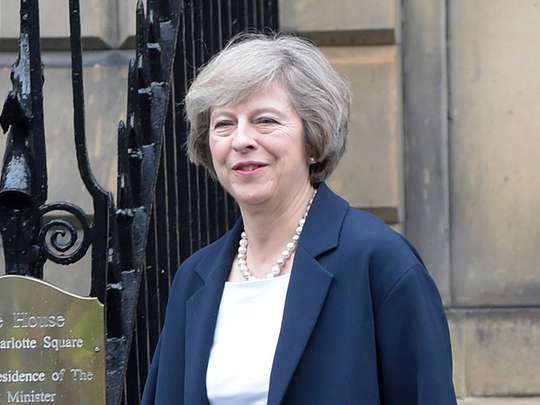
Forgive a statement of the obvious, but only with the arrival of Theresa May in Downing Street has it begun to sink in: Britain is going to leave the European Union. In the three weeks after Britons voted to do so, people were so horrified/delighted/confused that they couldn’t quite focus on this simple reality. Remainers, in particular, used to having things their own way, somehow imagined that it would not be allowed or could be reversed.
Some Leavers, with opposite emotions, thought the same. It was hard to see how the popular will and a government that had argued for a Remain vote could be aligned. But the British parliamentary system is admirably flexible. Suddenly there is a government by the same party, but facing the other way. Without much danger to civil peace, and none at all to constitutional order, there is a new prime minister. The plans for exit are in the hands of new ministers, most of whom want it to happen.
Although Britain has been in “Europe” for 40 years, it turns out it has not completely lost the political skills needed to run an independent nation. Behind the chaos of recent days, a certain ruthless efficiency has been at work. So only now are people — including those in charge — beginning seriously to contemplate what Brexit means. It means both less and more than has been said.
Less — because this is not an emergency. Immigrants are not about to be kicked out. International business is not fleeing. Britons are not going to need visas for France. Scotland is not about to secede. Trade is not going to cease and nor are friendly alliances with other European powers. Britain will not have an emergency austerity Budget, and George Osborne, who pretended they were, is out More — because this is the biggest peacetime change in the nature of the country that anyone can remember. It is bigger, even, than the change which took place when Britain entered the European Economic Community in 1973, because that came quite stealthily, and didn’t present itself with full force until the invention of the single currency in the Nineties. Brexit is not, primarily, a negotiation, but a new path.At present, attention centres on the nature of the deal which Britain shall end up making with the EU.
Obviously, the deal matters greatly, but Britain should shape the terms of the divorce in the light of its vision of life after it, not the other way round. Once the UK is not in the EU, it will need a new foreign policy, immigration policy, trade policy... It will also be free to settle down to decide whether it really wants to outbid former European partners in trying to save the planet by loading ever-higher energy costs on the population.it will be free to decide lots of things for itself. Luckily, because Britain is blessed with legal and political systems that predate the EU by hundreds of years, it will not have to reinvent these. But it shall certainly want to recharge them. Britain’s Supreme Court actually will be supreme.
Need for better scrutiny
It would be a good thing to declare that all further preliminary references of British cases to the European Court will forthwith cease. The British Parliament will quite soon make, once again, 100 per cent of the laws it approves. It will need much better scrutiny procedures to do this than those to which, in its recent decadence, it sank. Rather than waiting upon the eventual details of the deal, the government needs to prepare now for its departure, deal or no deal.
Britain should open talks with friendly Anglo-sphere nations, such as Canada and Australia, who thrive on free trade. If it negotiates on the basis that continuing membership of the EU single market — and joining the European Economic Area — is essential to Britain’s economic survival, it will lose. Britain would also be betraying voters’ expectations about immigration control. Howe also says that the UK must work out, while negotiating, what it should do with existing EU laws, so as to be ready when it recovers the unimpeded right to make its own. In a way (this is my image, not Howe’s), Britain’s mindset should be that of a colonial country preparing for independence: The negotiations are important, but Britain need not fear them, because the key outcome is not in doubt. Britain knows that, at the end of it all, it shall be free.
What is needed now is not yet another piece of monetary magic to compensate for austerity, but a fiscal stimulus. Instead of a few Osbornian grand projects, Philip Hammond — the new chancellor — could decide to build more roads, schools, power stations and houses. May has hinted at some of this already, but the way she has constructed her government seems to see Brexit as a special subject. It is the opposite: It is now the destiny of the whole. She may not realise it yet, but — in a way that even former British prime minister Margaret Thatcher might have envied — she has before her the real chance to be in charge.
— The Telegraph Group Limited, London, 2016
Charles Moore is an English journalist and a former editor of the Telegraph.









